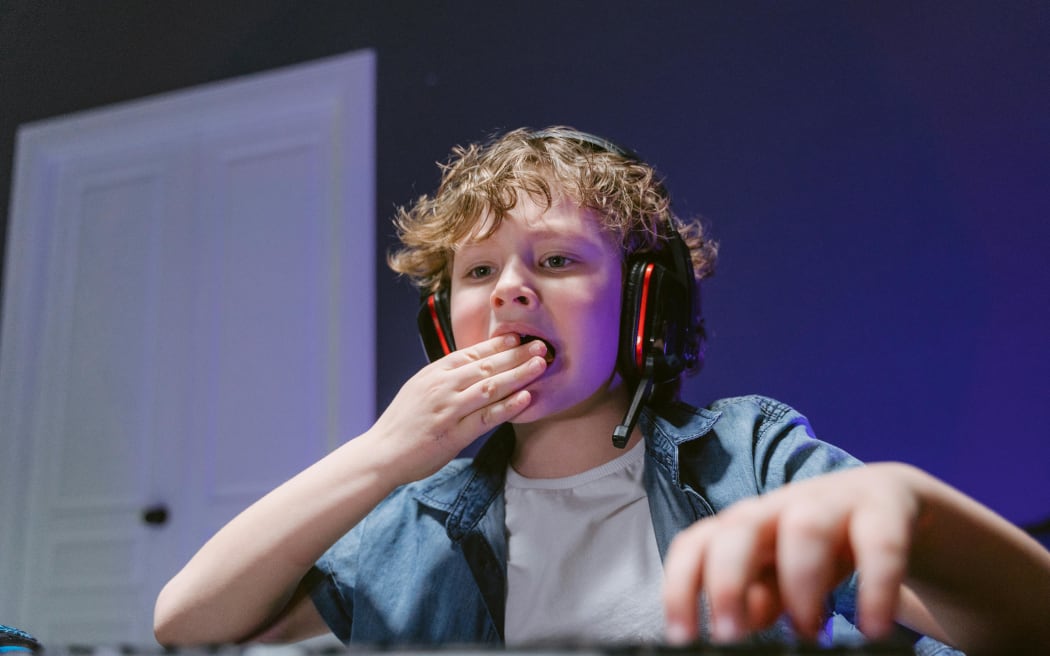
Melanie Hempe Photo: supplied via Screenstrong
After her oldest son Adam became addicted to gaming as a teen, American nurse Melanie Hempe didn't want the same for her three other kids.
Now she helps other parents redirect their children back to the "real in-person world" via the non-profit organisation ScreenStrong.
"We all know [screen addiction] is a problem and now we have to look at what we can do to fix it. There is a lot of hope because the solution doesn't cost any money," Hempe tells Jesse Mulligan.
ScreenStrong has a Screen Addiction Quiz, instructions for a 30-day Screen Detox and other free resources on their website.
For Adam, playing video games went from a "very casual" pastime to his go-to activity in high school, Hempe says.
She didn't enjoy becoming "the game cop mom" with a kitchen timer but didn't see an alternative.
"It's very frustrating to feel like you're allowing something in your house that's making your child angry at you all the time and it was causing a lot of conflict in our home."
Hempe now recognises that Adam's anger and aggression were due to a dopamine crash that comes with the overuse of video games, social media, and pornography.
"When [dopamine] stays high for too long - like it does with drugs and alcohol and video games - then we have a problem because our kids have a really hard time with that crash.
"We parents know what this looks like, right?"
Although Hempe had hoped the answer for Adam would be going to university, she immediately knew something was wrong when she picked him up after his first freshman year.
"He looked like he was on drugs. He looked very emaciated. He had not left his room in over a week. He hadn't gone to the cafeteria to eat. He looked a mess."
Although Adam told his mum that he wasn't on drugs, he had lost his sense of purpose and was dropping out of university.
Around the same time, Hempe started researching screen addiction, eventually sharing her knowledge at the school with an audience of over 100 fellow parents.
"I realised, Oh, my goodness, we are not the only ones struggling with this. So that's when ScreenStrong was born, so to speak.
"Since then, I have been educating parents on the warning signs of screen addiction, whether it's a video game, or social media, it's all the same. It's the same area in the brain that is really distorted with these addictions."
The ScreenStrong community supports parents to keep devices out of their kids' hands during their most vulnerable stages of development, Hempe says.
"They will have the rest of their life to be on a screen. Right now we need to teach them basic life skills, grit and hard work and how to study and how to have social relationships and really to stay connected to their families."
With any potential addiction, the first thing to look at is access, Hempe says.
Many parents try to moderate their kids' use of video games, but she doesn't believe this is a case where the "everything in moderation" approach can work.
"Parents get really tripped up with this. They think my kid is so smart, he's so mature. Your kid is very smart, he may be brilliant, but he is not mature, he is not able to withstand the temptation."

Photo: Tima Miroshnichenko
After conducting "a very bad experiment" with Adam, Hempe's three other kids were given only flip phones and disallowed from using social media.
Despite this, her two younger sons were both voted senior class president and her daughter developed deep friendships with a few girls via texting and phone calls.
"Girls that are on social media are very lonely. It is a very lonely place. There's high rejection pain on social media. My daughter was never rejected on social media because she wasn't there. She never felt lonely."
Our culture of screen addiction is like a pendulum that can only "swing out there for so long", Hempe says.
"Initially, everybody kind of jumps off the cliff and does everything but it has to come back to the centre because it's not working. The anxiety and the depression and the loneliness... kids are suffering, we have to get it back to the centre.
"My son, who was very addicted to video games, says cold turkey is the way to go. There's no other way to do it. You have to just take it away, but you have to be prepared, you know, the longer they've been dependent on that screen. You have to fill that void."
Not every parent is able to take this approach to deterring their kids from screen addiction, Hempe says, because it involves spending more time with them initially.
"Because they're kind of stunted, right? they're anxious, they're depressed, they're lonely."
Parents who have banned their kids from using smartphones report a better sense of family connection, Hempe says.
"The biggest thing we hear [from parents] is I'm talking to my kids more. They're spending more time with me, I'm getting to know them better. They briefly left the planet and now they're back."
Adam did drop out of university after this first year, Hempe says, and was redirected from his screen-focused existence by a brief stint in the military.
"The only thing that you can do to reset a child or an adult, for that matter, [with screen addiction] is a detox. So he went into the military, he had 14 weeks of basic training and 14 weeks without his video gaming so that he was able to reset.
"The saddest thing about Adam's story is that he became very detached from his family and his friends and his extended family. And that is such a very important part of mental health for our kids, as well as for us."
Adam, who has now graduated law school, wishes he could get back the 10,000 hours he believes he spent gaming during high school, Hempe says.
She reminds her son it was his gaming addiction that prevented his brothers and sister from potentially going down the same path.
"That's where my message is so positive. And I love sharing this with other families that if you're struggling with this you don't have to keep struggling. Of course, the more our kids are immersed in these technologies, the harder it is to get them back but you can get them back. And if you have young kids, you do not have to take that pathway. It is not necessary or mandatory for any child to be on a video game."

